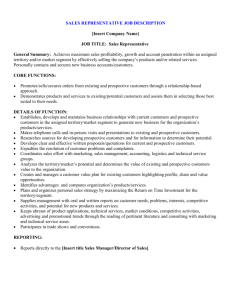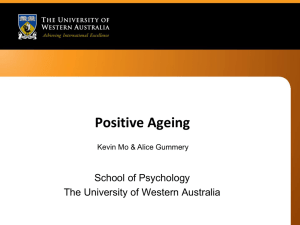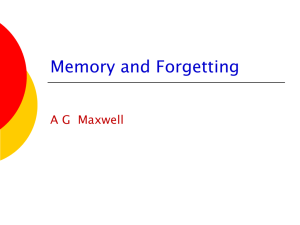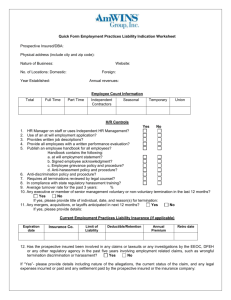A Study on Values among Prospective Teachers in
advertisement
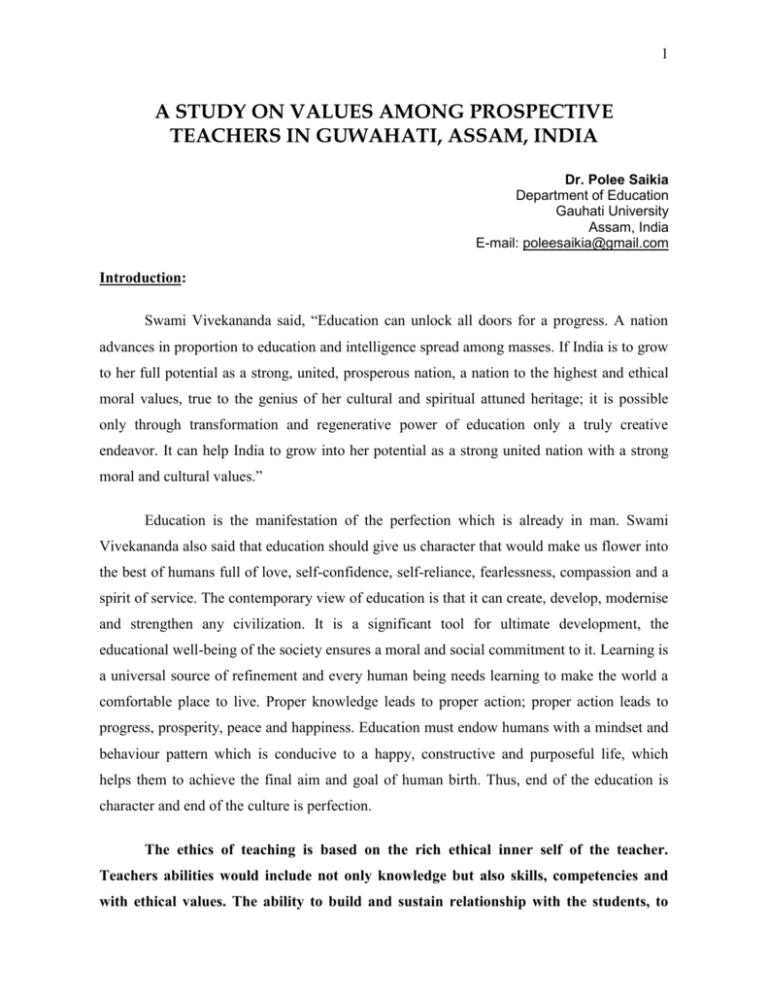
1 A STUDY ON VALUES AMONG PROSPECTIVE TEACHERS IN GUWAHATI, ASSAM, INDIA Dr. Polee Saikia Department of Education Gauhati University Assam, India E-mail: poleesaikia@gmail.com Introduction: Swami Vivekananda said, “Education can unlock all doors for a progress. A nation advances in proportion to education and intelligence spread among masses. If India is to grow to her full potential as a strong, united, prosperous nation, a nation to the highest and ethical moral values, true to the genius of her cultural and spiritual attuned heritage; it is possible only through transformation and regenerative power of education only a truly creative endeavor. It can help India to grow into her potential as a strong united nation with a strong moral and cultural values.” Education is the manifestation of the perfection which is already in man. Swami Vivekananda also said that education should give us character that would make us flower into the best of humans full of love, self-confidence, self-reliance, fearlessness, compassion and a spirit of service. The contemporary view of education is that it can create, develop, modernise and strengthen any civilization. It is a significant tool for ultimate development, the educational well-being of the society ensures a moral and social commitment to it. Learning is a universal source of refinement and every human being needs learning to make the world a comfortable place to live. Proper knowledge leads to proper action; proper action leads to progress, prosperity, peace and happiness. Education must endow humans with a mindset and behaviour pattern which is conducive to a happy, constructive and purposeful life, which helps them to achieve the final aim and goal of human birth. Thus, end of the education is character and end of the culture is perfection. The ethics of teaching is based on the rich ethical inner self of the teacher. Teachers abilities would include not only knowledge but also skills, competencies and with ethical values. The ability to build and sustain relationship with the students, to 2 innovate, to develop new educational programmes, to meet the changing demands of the society and most importantly to inculcate human values among students. A student is like a seed, which needs constant showering of knowledge, advice and guidance to bloom into a beautiful flower. It is mainly the teacher whom he/she depends upon for this nourishment. So, the aim of true education is to make a perfect human being in terms of service to mankind and deliverance of one’s soul. True education should break all bondages and make men and women worthy human beings. It is also true that there will never be true education until each and every teacher realizes the ultimate purpose of education and himself/herself a person of ethical/human values. Values are the guiding principles of life that contribute to the all round development of an individual. They give a direction to life and thus bring joy, satisfaction, peace and add quality to life. Values give meaning and strength to an individuals character by occupying a central place in his/her life. Values reflect one’s personal attitude and judgement, decisions and choices, behaviour and relationship, dreams and visions. These values influence our thoughts, feelings, and actions and guide us to do the right things in life. Thus, we can say that any human activity, thought or idea, feeling, sentiment or emotion, which promotes self-development of an individual, constitutes a value. The other corresponding function of a value is that it should also contribute to the welfare of the large social unit such as the family, the community and the nation of which an individual is a constituent. Values are the backbone of the society. Objectives: 1. To study the value patterns of the prospective teachers. 2. To find out whether the prospective teachers differ in their values with regard to gender. Hypothesis: Ho1 – There exists no difference between male and female prospective teachers regarding values. 3 Methodology: The present study has been carried out by employing descriptive survey method. Sample: For the purpose of the present study, a sample of 100 prospective teachers from two private B. Ed. Colleges of Guwahati city, Assam India with a equal proportion of 50 male and 50 female prospective teachers have been taken as sample. To draw the sample, simple random sampling technique has been used. Tool: In the present study, standardized Personal Value Questionnaire developed by Dr. G.P. Sherry and Prof. R.P. Verma has been used to measure the values among the prospective teachers. Following 10 (ten) values were selected for assessment, i.e. – Religious value, Social value, Democratic value, Aesthetic value, Economic value, Knowledge value, Hedonistic value, Power value, Family Prestige value and Health value. Significance of the Study: There has been a rapid deterioration of ethical and moral values in the society. The quality of a nation depends upon the quality of its citizens. The quality of the citizens depends upon the quality of education and the quality of education depends upon the “Quality Teachers”. Teachers role is very vital in moulding the future of a country, and as such it is considered as the noblest profession. Generally, it is said that, what a teacher says, what a teacher does; doing aspect is more effective than his saying. The doing aspect evolves emotions and activity which is known as conduct. The Values are Codes of conduct. The knowledge of values is the theoretical aspect, the conduct is the operative aspect of values which is essential for inculcating values among students. The values are inculcated inside the classroom and outside the classroom in a school. A teacher has to generate a conducive environment in the classroom as well as outside the class and shows an ideal model of his/her behaviour for inculcating values among his/her students. 4 For inculcating values among students, a teacher himself/herself be a role model and a person imbibed with values. As such to study the different value patterns of the prospective teachers, the present study has been undertaken. Analysis and Results: In the present study 100 prospective teachers have been selected for identifying their value patterns with the help of Personal Value Questionnaire. In the personal value questionnaire, analysis has been made on ten (10) different values of 100 male and female prospective teachers of two B. Ed. Colleges (Teacher Training Colleges). The values are – Religious value, Social Value, Democratic Value, Aesthetic Value, Economic value, Knowledge Value, Hedonistic Value, Power Value, Family Prestige Value and Health Value. Table – A Mean Scores, SD and‘t’ value of Prospective Teachers on Human Values. Human Values Religious Value Social Value Democratic Value Aesthetic Value Economic Value Knowledge Value Hedonistic Value Power Value Family Prestige Value Health Value Female Mean 16.28 16.47 15.34 16.40 11.10 10.95 14.35 12.10 13.14 13.60 SD 3.95 4.16 2.84 4.12 2.00 2.75 2.79 2.26 2.98 3.30 Male Mean 13.40 13.60 16.01 14.15 11.30 10.63 14.66 12.50 12.60 13.30 * -.05 significant **-.01 significant From Table (A) following results have been drawn - SD 3.30 3.50 3.22 4.00 2.10 2.64 3.28 2.35 2.44 3.10 ‘t’ Value 9.83 9.56 1.40 6.81 1.25 .76 .64 2.22 1.32 1.34 Remark * ** NS ** NS NS NS * NS NS 5 In this study, it has been found that the Mean scores of Female Prospective Teachers in regard to all the value dimensions were as follows – Religious Value = 16.28, Social Value = 16.47, Democratic Value = 15.34, Aesthetic Value = 16.40, Economic Value = 11.10, Knowledge Value = 10.95, Hedonistic Value = 14.35, Power Value = 12.10, Family Prestige Value = 13.14 and Health Value = 13.60. On the other hand, Male Prospective teachers mean scores were Religious Value = 13.40, Social Value = 13.60, Democratic Value = 16.01, Aesthetic Value = 14.15, Economic Value = 11.30, Knowledge Value = 10.63, Hedonistic Value = 14.66, Power Value = 12.50, Family Prestige Value = 12.60 and Health Value = 13.60. In this study is has been found that in regard to – Religious Value (16.28), Social Value (16.47), Aesthetic Value (16.40) and Family Prestige Value (13.14) – female prospective teachers show slightly higher value patterns than their male counter parts. The differences are found significant in regard to Religious, Social and Aesthetic Value. It has been found that in regard to Democratic Value, males have shown slightly higher value patterns in comparison to their female counter parts, as males means score was found 16.01 and female found as 15.34. Though there has been found difference between male and female prospective teachers in regard to Democratic values, but the difference is not significant. The study also reveals that there exists significant difference between male and female prospective teachers in relation to Power Value (Table-A). Suggestions and Conclusion: The NCTE Teacher Education Curriculum : A Framework (1978) had set guidelines for a functional value-orientation of teacher education for preparing teachers which can be termed as the Historic milestone in the progress of Teacher education in India, the teacher education institutions should strive to produce a teacher who should: 6 1. Develop Gandhian values; 2. Perceive his role as an agent of change in the community; 3. Perceive his role not only as a leader of children but also that of a guide to the community; 4. Act as liaison between the school and the community and employ suitable ways and means for integrating community life and resources with school work; 5. Possess warm and positive attitude towards growing children and their academic. Socio-emotional and personal problems, with skills to guide and counsel them; 6. Not only use but also help in the preservation f environmental resources and preservation of historical monuments and other cultural heritage; 7. Develop understanding of the objectives of school education in the Indian context and awareness of the role of school in achieving the goals of building up a democratic secular and socialist society; 8. Develop understanding, interests, attitudes and skills which would enable him to foster all-round growth and development of the children under his care; 9. Develop competence to teach on the basis of the accepted principles of teaching and learning; 10. Develop communication and psychomotor skills and abilities conducive to human relations for interacting with children in order to promote learning inside and outside the classrooms; 11. Keep abreast of the latest knowledge of the subject matter he is teaching and the techniques of teaching the same; 12. Undertake action research and investigatory projects. 7 13. The teacher to be a mediator in the encounter between the individual and the mass of information, which daily threatens to engulf him, an encounter in which selection and use of knowledge becomes more important than its absorption. 14. He should adopt Conscientization model of education in place of the dysfunctional Banking model so far in vogue and enable the trainees to become aware of the realities of the social situation. 15. He should strive to develop a social climate in which hero-worship, sycophancy, irritationality, sensuousness and exploitation do not find any place. Teacher as a teacher inspires students and make them confident to realize their full potential, enhance self esteem, make them perfect Human Beings and take pride in their roles as the part of the society. To make teachers as perfects leaders and humans, following suggestions are given – Value education as a core subject should be included in the curriculum of Teacher Training Programme. Value education subject should be activity based. Teacher training programme should be atleast of 2 years duration. Pre-Service Teacher training should be mandatory before applying in a teachers’ Post. Seminars, Conferences, Workshops etc. should be held in regular basis for teachers and parents should be involved in these programmes. Apart from those programmes, cultural and social service programmes should be organized in the educational organizations. There should be orientation courses for all teacher educators of every institution of teacher education for 3-4 days in the beginning of every session to focus their attention on the need, goals and means of value orientation of teacher education curricula. Professional development training programming like Refresher Course, summer camp. Short term training programming should be provided for all teachers and teachers educators. 8 Theory courses at all levels of teacher education should be revised and revitalized incorporating in them value content, new ideas, ICT, new concepts and progressive outlook. More and more of co-curricular activities involving corporate or group activities should be promoted. Selected of staff and students should be fair, Protests should be lodged and pursued through press and other forums against corrupt practices. Professional code of conduct and professionalization should be discussed in the institutions so that the pupil-teachers also learn them. Close dynamic relations should be developed with other subsystems and institutions, so that the proverbial isolation of the colleges of education is broken. The climate of creativity should be vigorously promoted. The teacher educators should be annually judged on the basis of their publications, research, innovations, and due rewards and punishments meted to them. Teachers academic achievements should be annually judged on the basis of their annual report and their promotions should be related with their academic achievements and teachers accountability. “Values are not be taught, but to be caught”. References: 1. A. Pathania and K. Pathania, “Teachers’ Initiative towards Quality and Value Education”, University News, Vol. 49, No. 21, May 23-29, 2011. 2. M.S. Kurhade, “University Education: A Need to Reflect”, University News, Vol. 51, No. 48, December 02-08, 2013. 3. S.P. Negi, ‘Inculcation of Human Values among teacher trainees of B. Ed. Colleges in Punjab, The CTE National Journal, Vol. XI, No.1, Jan-June, 2013. 9 4. S. Kalita, ‘Value Patterns of College students in Relation to Socio-economic status with special reference to greater Guwahati, Unpublished M. Phil. Dissertation, G.U. 5. S.P. Ruhela, ‘Value Orientation of Teacher Education Curricula in India’, Human Values and Education, Book edited by S.P. Ruhela, Sterling Publishing Pvt. Ltd., New Delhi. .6 V. Balamohandas and M. Sharma, “Quality Teachers: A must for Quality Higher Education”, University News, Vol. 50, No. 03, January 16-22, 2012. ....................... 10
